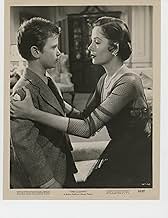In the mid-20th century, Hollywood made quite a few drama films about a man or woman raising a child alone. Many of those were single parents whose spouses had died. But, some were dramas about broken families. The stories weren't about the divorces so much as they were about the difficulties the man or woman and child went through. "The Clown" has a familiar plot for that time. The parent - usually, but not always, the father, couldn't keep a job and care for his child well, due to his drinking, gambling habits, or other addiction.
That's the gist of this film, with Red Skelton giving a very good performance as the father, Dodo Delwyn. Some may think, as I did, that it's strange that the screenplay doesn't give the character's full, or real name, as is usual. The first name, Dodo, is silly and like a nickname or a name used for someone who was dumb or goofy. But, in the film, Delwyn comments about coming from a vaudeville family where his parents were actors and entertainers. So, one can imagine that that was the name his parents gave him, not thinking about the culture of the future.
This was the fist acting role for Tim Considine who was then 12 years old. He does a superb job in playing a boy raised just by his dad. And Dink has a little more savvy than most kids his age, from his experiences. Considine would appear in a few more films but most of the rest of his acting career was on TV in various series. He is most known and recognized for his role as the oldest Douglas family boy in the long-running and very popular TV series, "My Three Sons." The series had 380 shows from 1960-1972, and Considine appeared in 185 of them from 1960-1965. He was also a writer, but after the 1970s, his acting consisted of just an occasional appearance on film.
Modern audiences may find this film quite slow, and I admit to thinking it was boring for the first half hour. I had seen it many years before, probably on late night TV. I can see why this type of film may not be made in modern times. Divorce is common place today and many, many children grow up in single parent homes. No doubt there are many with problems of addiction, abandonment, unemployment and an irresponsible parent. If a boy or girl today doesn't live in such a family, they will know someone at school or in their neighborhood who does.
At the time this film was made, there was interest in seeing stories where people did make it, and where children had tough backgrounds. Some of them were about a heroic parent who rose above the difficulties. But others were like this one, where Dodo's weak character made him quite irresponsible. No one ever doubts the heart of someone like Dodo. He surely loved his son. But in his head, he was too proud to ask Dink's Uncle Goldie for help. And Goldie wasn't someone who chastised Dodo, but a one-time close friend and fellow performer who genuinely loved Dodo and Dink. So, this film is a very good picture of how one's pride can hurt the very people a person loves.
Whether or not the producers intended the film that way, it's very clear in the screenplay and Dodo's persona. This is billed as a comedy first, but it clearly is not such. There is comedy in two segments with Skelton performing. The first isn't as hilarious as the picture intimates with the audience laughter. But the last stage performance before a live TV audience for a new show of his own, Dodo does give a very good and very funny performance. That reminded me of the Red Skelton TV show and some of the characters he played way back then. In the 1950s and '60s we had many a laugh with Red's many characters. But the two that stood out and always garnered uproarious laughter were his Clem Kadiddlehope and Freddie the Freeloader.
This movie was a remake of a 1931 film, "The Champ," in which the man was a boxer. It starred Wallace Beery and Jackie Cooper, with a much better role for the mother, played by Irene Rich. The 1931 film was much better and seemed to suit the times much better as well.
























